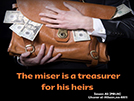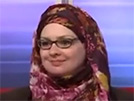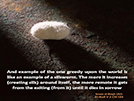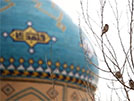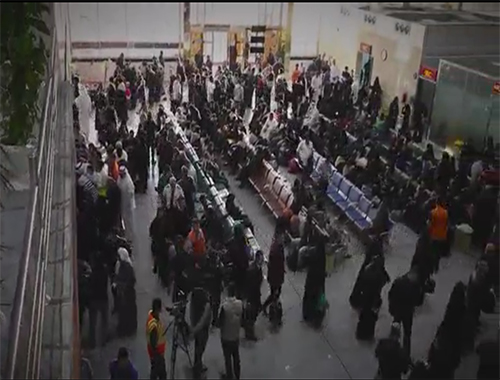No extravagance in charitable acts
- Details
- Hits: 2504
No extravagance in charitable acts
The author of the present work is very strongly of the opinion that there is no extravagance in charity. Even if a person gives his total wealth with the intention pleasing Allah (S.w.T.) and of achieving Divine blessings he does not do anything unacceptable. He justifies his opinion on the basis of a few of the many ayats.
The ayat,
“And do not move your hand...”
is a lenient prohibition and does not mention the act as HarÄm or MakrÅ«h. Also the ayat,
“And they who when they spend, are neither extravagant nor parsimonious, and (keep) between these the just mean.”
maypertain to househld expenditure and not to that which is spent in the way of Allah. It may also mean that those who are not stingy and also not extravagant are the obedient creatures of the Beneficent Lord. As regards the ayat,
“eat of its fruit when it bears fruit,...and do not act extravagantly” and “surely He does not love the extravagant...”
we can say that both these sentences form a single statement. The tradition, which explains the ayat also shows that the two are interrelated. Though it is true that a person who donates the entire crop in charity and does not keep anything for his family and children certainly commits IsrÄf. Charity and selflessness is permitted, but feeding and clothing his dependents is Wajib upon him. One who deprives his dependents of the basic needs and gives everything in charity has acted against Divine commands. But if he feels assured that he will be able to fulfill the needs of his family from other sources or that his dependents will not claim their rights from him, it is permitted for him to give everything away for the sake of Allah. This can be supported by the examples from the lives of the Holy Imams (a.s.). For example, Hazrat Amir ul-Mu’minÄ«n ‘Ali (a.s.) had time and again performed such sacrifice of his total belongings. Once he sold his orchard for twelve thousand Dirhams and distributed the complete amount among the poor and needy. He did not save anything for his family, but ‘Ali (a.s.) and other great personalities never deprived their own dependents. Whenever they performed such charitable deeds they had faith in themselves that they would be able to provide their families from some other means. Whatever has been stated with regard to the ayats prohibiting over-spending can also be supported with the tradition of the Holy Prophet (S) wherein he denounced the person who spends all his wealth and dies leaving his minor children destitute and helpless. It is prohibited for a person to spend his complete wealth in charity when he knows that after him his children will be in need of it. If he leaves a legacy for his children who have no other source of income; the legacy shall also be in the way of Allah.
It is for this reason that drawing a will for more that a third of one’s total property is prohibited. It is also commanded for those who have young children to will for less than a third of their wealth.
The traditions of selflessness apply to only special circumstances. Extreme generosity is not prohibited and whatever has been said about the meaning of the ayats explains the tradition of Ibn Abi Umair. The narration of Sahih of Bazanti may imply that, it is not proper to over-spend where Imam (a.s.) has prohibited extravagance. The tradition of Faqih may concern those people who spend in recommended ways, where it is incumbent for them not to spend. The tradition of Imam (a.s.) may also be a refutation of the Sufis’ assertion that extreme selflessness is incumbent and the Imams (a.s.) have also pointed out that spending for ones family’s needs is also like spending in the way of Allah (S.w.T.). The words of tradition also imply that moderation in ways of charity is emphasised with a gentle command. In other words over-spending in charity is only a recommended prohibition whereas we are aware of the incomparable charitable acts of the Holy Prophet (S) and the Imams (a.s.), and verses that were revealed in the praise of these deeds (The ayat of ‘HalatÄ’ and the verse of ‘Najva’).
Moreover, we see that Imam Hasan (a.s.) in his life gave half his wealth in charity to the poor and needy, on Three occasions. The charitable deeds of Imam Husain (a.s.) and other Imam (a.s.) are also well known. Imam RiÄa (a.s.) donated his total wealth in charity at Khurasan on the day of Arafat. When Fazl ibn Sahl pointed out that Imam (a.s.) has suffered a great loss, Imam (a.s.) replied that,
“Whatever I received as my share is sufficient.”
Again on the day of Navroz when he assumed the seat of heir apparent of Ma’mÅ«n under duress, he gave away all the presents and gifts to a single poet who had recited in praise of Ahl ul-Bayt (a.s.).
Hazrat Imam Ja’far as-Sadiq (a.s.) has been reported to have said,
“If all the world becomes my property and becomes a single morsel and I place it in the mouth of a single believer; I will not consider myself extravagant.”
Imam Hasan al-Askari (a.s.) says:
“If all the world becomes a morsel and I give to a true worshipper of Allah I will feel I have not fulfilled his rights completely and if I give even a gulp of water to a starving disbeliever; I consider myself extravagant.”
These two narrations expound the fact that even if the whole world is gifted to a sincere and a pious believer it will not be extravagance, because he deserves it.
Numerous instances of selflessness of pious scholars have been recorded. Some of these righteous people have seen the rewards of their charity in their worldly life. RawzÄtul Jannat contains an incident regarding Muhaqqiq Ardebeli that during the times of famine he used to give away to the poor whatever he had. He used to live in poverty himself. One day when he had donated all his possessions his wife became angry with him that he had deprived his children in such times when food was scarce. He left his home and went to the mosque and sat there in EhtekÄf. An unknown person arrived at the door of his house and handed sacks of wheat and flour saying that master Ardebeli sent it and that he was in EhtekÄf at the mosque of Kufa. When Muhaqqiq Ardebeli returned home from EhtekÄf his wife told him that he had sent very fine wheat and flour. When he learnt of the details he realized that it was a Divine favour upon him and fell down in prostration to thank the Almighty. Many times it was seen that the Muhaqqiq left home with an expensive turban but if he encountered a beggar he tore a piece from it and gave it in alms. On numerous occasions he returned home bare-head.

